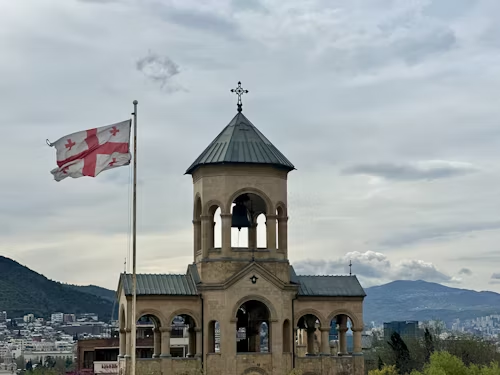Thousands of Georgians gathered outside parliament on Monday evening, protesting what President Salome Zourabichvili called a “rigged” election. Demonstrators waved Georgian and European Union flags as Zourabichvili declared, “You did not lose the election. They stole your vote and tried to steal your future. No one has the right to do that, and you will not allow it!”
Zourabichvili, though largely a ceremonial figure, pledged to defend Georgia’s European aspirations against the ruling Georgian Dream party. “We have no alternative, and we want nothing more for future generations,” she said, but did not provide evidence of Russian involvement in the alleged vote theft.
The protest exposed deep divisions in Georgia, a nation located between Russia and Turkey. The Georgian Dream party has faced criticism for authoritarian measures and closer ties with Moscow. The demonstration ended peacefully after several hours, with no immediate plans for further action.
Opposition Calls for New Election
Giorgi Vashadze, leader of the United National Movement coalition, announced that opposition parties would reject government legitimacy. “We refuse all mandates and will not enter this parliament. We are committed to fighting for victory together,” he declared.
Opposition leaders demanded a new election under international supervision. The United States and the European Union have called for thorough investigations into the election results. “Georgians, like all Europeans, must control their own destiny,” said EU Commission President Ursula von der Leyen.
US officials urged Georgia to repeal authoritarian laws and address electoral issues. State Department spokesman Matthew Miller criticized the ruling party’s misuse of public resources, vote-buying, and voter intimidation during the election process.
Election Results and International Reactions
The Central Election Commission reported that Georgian Dream received 54.8% of the vote with nearly all ballots counted. The party, founded by billionaire Bidzina Ivanishvili, has passed laws similar to those used by the Kremlin to suppress free speech and LGBTQ+ rights.
The Kremlin denied any interference, with spokesman Dmitry Peskov accusing the West of meddling in Georgia’s election. He claimed Zourabichvili’s call for protests was an effort to destabilize the country. Parliament speaker Shalva Papuashvili accused the president of plotting a “coup scenario” against Georgia’s constitutional order.
The EU suspended Georgia’s membership application process indefinitely after the passage of a “foreign influence law” in June. The law, viewed as a setback for EU integration, intensified concerns about Georgia’s democratic future.
Divisive Election Climate and Allegations of Intimidation
The Georgian election campaign, held in a nation of 3.7 million people, was marked by fierce competition and accusations of a smear campaign. European observers described the election atmosphere as “divisive” and criticized the use of intimidation, vote-buying, and violence.
Antonio López-Istúriz White, head of the European Parliament’s monitoring delegation, accused Georgian Dream of using “anti-Western rhetoric” and spreading Russian misinformation during the campaign. Incidents of voter intimidation were particularly severe in rural areas. Georgian Dream secured nearly 90% of the vote in the Javakheti region, compared to no more than 44% in any district of the capital.
Orbán’s Visit Sparks Controversy
Hungary’s Prime Minister Viktor Orbán, a close ally of Russian President Vladimir Putin, arrived in Georgia on Monday for a two-day visit. His visit drew criticism, especially given the EU’s call for an independent investigation into electoral fraud.
President Zourabichvili dismissed Orbán’s visit as a “political play,” calling him a “special friend” of the ruling Georgian Dream party. The timing of his visit fueled speculation about Georgia’s growing ties with authoritarian figures in Europe.
